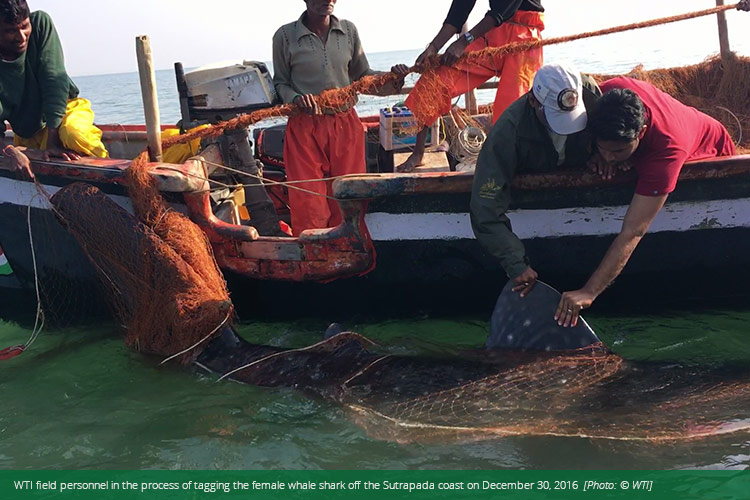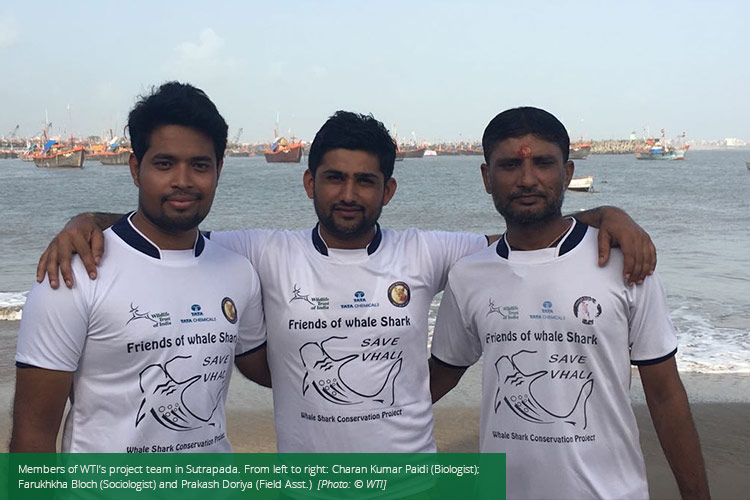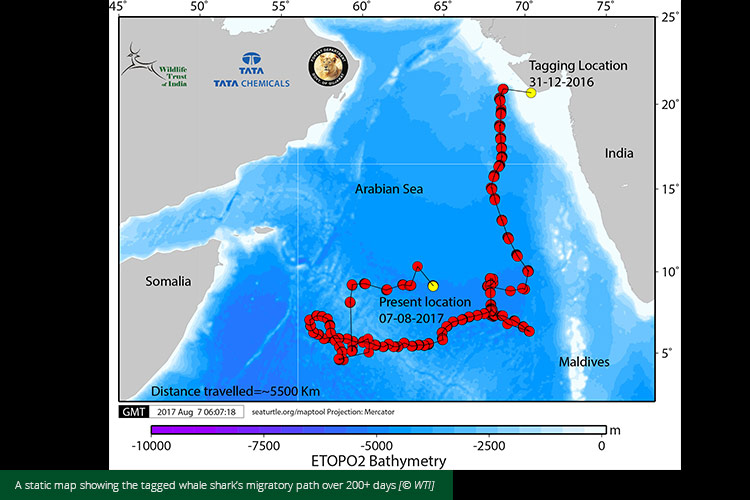An interactive trail map showing the whale shark’s migratory path. (Use the controls on the map to play/pause or zoom in/out.)
Sutrapada, Gujarat, August 08, 2017: The migratory path of a female whale shark that had been satellite-tagged off the Saurashtra coast in December 2016 under the Whale Shark Conservation Project – run by Wildlife Trust of India (WTI) and the Gujarat Forest Department with support from Tata Chemicals Ltd – has now been monitored via satellite for over 200 days. This is the first and longest migratory movement of whale sharks ever recorded from the Indian subcontinent.
The whale shark has covered a distance of bout 5500km (2970 NM) since it was tagged, over a total of 200 tracking days as of August 7. Having moved from Sutrapada towards the coast of Somalia, it now seems to be circling back to the Gujarat coast.
“The efforts of the WTI team have provided a new milestone for our understanding of whale sharks in the Indian Ocean”, said Dr Mark Meekan of the Australian Institute of Marine Science.
“The 200+ days of tracking data from the Gujarat coast almost to the Somalian coast (African coast) confirms the understanding that these gentle giants are long distance migrants”, said Prof. BC Choudhury, Senior Advisor, WTI. “What is even more satisfying is the habitat utilisation information obtained from the tracked individual in the Arabian Sea Large Marine Ecosystem. I hope the tagged whale shark will return back to the Gujarat coast to complete a giant circle.”
News of the ongoing tracking has garnered considerable interest from marine scientists across the globe. “This is indeed a great achievement!” said Dr Brad Norman, Director and Lead Scientist at ECOCEAN. Since my first visit to Gujarat in 2007, I have continued to follow the outstanding progress of the whale shark research program. WTI’s project is playing an important role in helping us to better understand this endangered species and ultimately assist in its global conservation.”
“The efforts of the WTI team have provided a new milestone for our understanding of whale sharks in the Indian Ocean”, said Dr Mark Meekan of the Australian Institute of Marine Science. “With their 200+ days of tracking, the final piece in the jigsaw puzzle of whale shark migration in the region is starting to fall into place. It’s a great achievement for both conservation and shark science.”
* * *
At 9.30am on December 30, 2016, a fisherman named Herabhai from the coastal village of Sutrapada in Gujarat had informed the WTI project team that a whale shark was entangled in his fishing nets approximately four nautical miles off the coast. The field team had reached the location at 10.14am, having informed the Range Forest Officer and Customs Superintendent, who also participated in the rescue. The whale shark, about 18-20 feet in length, was found in good health and quite active. A tissue sample was collected for genetic analysis, after which the satellite tag was attached and the whale shark freed.
This was the seventh successful tagging accomplished under the Whale Shark Conservation Project, and has emerged as a record breaking one.


